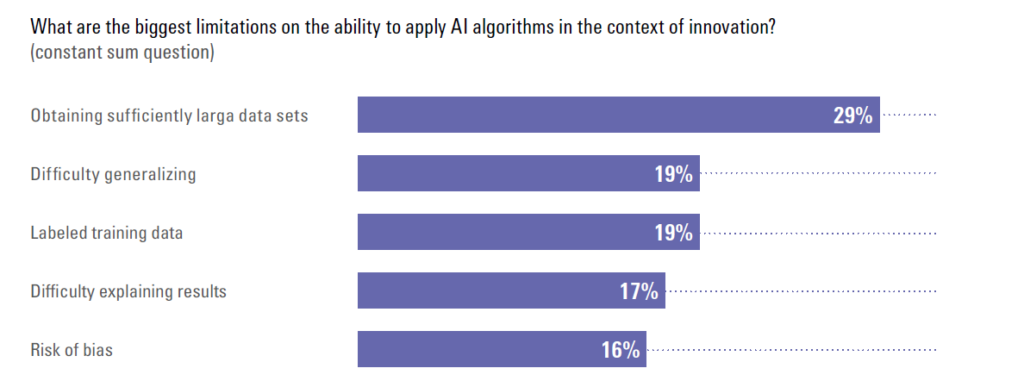Our latest study of 162 AI-savvy innovation managers shows that while a large majority of companies agree on the high potential of AI-based innovation management and expect an overall improvement in innovation outcomes, most companies are unable to overcome the challenges and obstacles associated with AI-based innovation management, such as lack of technical expertise, lack of infrastructure, low trust, or an AI-averse mindset. Consequently, many companies fail to apply AI-based innovation management. But not all of them!

About AI-Leader, AI-Pragmatists, AI-Aspirants – our study sheds light on all of them
In our study, we explore how organizations may prepare for and transform into AI-based innovation management. Our findings reveal clear differences in the preferences of how organizations use and implement AI-based innovation management. Three main types of companies can be identified, varying not only in their intended AI use, but also in their strategy, organizational structure, and approach to skills development:
1. AI-Leader
They lead the way towards autonomous innovation management at scale.
2. AI-Pragmatists
They are motivated but hesitate to invest and take bigger risks.
3. AI-Aspirants
take a minimum approach and are still figuring out the basics.
Our study gives managers a sound overview on AI-based innovation management and provides clear and actionable recommendations which may allow organizations the next boost in innovation management comparable to the shift from closed to open innovation.
Prof. Dr. Johann Füller, study author and Professor for Entrepreneurship & Innovation at the University of Innsbruck
Our study in 7 theses
1. Applying AI is considered primarily helpful for analytical and market-related innovation tasks, but a lack of experience and understanding prevents companies from extensively embracing AI.
2. Applying AI for innovation management is expected to improve innovation performance by more than 50%, but companies struggle to find appropriate approaches for realizing the perceived potential.
3. The main challenges companies face when implementing AI are the access to sufficiently large enough datasets on the data level and the lack of technical expertise on the organizational level.

4. Organizations follow different goals and approaches when it comes to implementing AI for innovation management.
5. Three different types of AI implementers can be found: 1) AI-Leaders, 2) AI-Pragmatists, 3) AI-Aspirants. The identified groups significantly differ according to their chosen strategy, organizational setup, and capability-building approach.
6. Company characteristics such as size, expertise, and perceived potential relate to certain AI implementation practices.
7. Depending on the respective pre-conditions and ambitions, AI-Aspirants, AI-Pragmatists, and AI-Leaders pursue deliberate strategies to further advance in the autonomous innovation game.
Did we get you?
Our study reveals the status quo of AI for innovation management and how it may impact the future of innovation management practice. It shows that AI will (r-)evolutionize innovation management and take the idea-to-launch innovation process to the next, more advanced stage.


